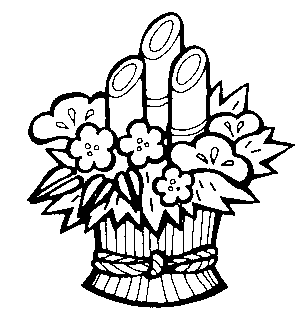:::::::::::::::::::::::::::::::::::::::::::::::::::::::::::::::::::::::::::::::::::::::::::::::::::::::::::::::::::::::::::::::::::::::::::::::::::::::::::::::::::::::::::::::::::::
. Kobayashi Issa 小林一茶 in Edo .
o-shoogatsu is a haiku season in itself with a lot of kigo
. WKD : 新年 SHIN-NEN Shinnen NEW YEAR - SAIJIKI .

....................................................................................................................................................
- - - Issa wrote :
....This time I'd arrived [in my hometown] in the depths of winter and hadn't arranged to lodge anywhere, so if I wasn't careful I could easily end my life frozen in a snowdrift somewhere....Just when I was trying to figure out what I should do, a compassionate man with a big heart who lives in the village told me he would rent me one corner of his house. Hearing that, I felt as happy as if I'd suddenly met Buddha in the middle of hell, and I moved in on the 24th of the Twelfth Month.
There, lying beneath a thick down quilt my student Kakou kindly gave me, I was able to survive the coldest days of the winter. Another student, Shumpo, gave me a mosquito net made of thick paper, and when I hung it up it blocked much of the cold, hard wind that came inside through the wall. Thanks to the kind help of these people I've somehow or other managed to get by and be here today to see the beginning of the Year of the Cock [1813].
よ所並の正月もせぬしだら哉
yoso nami no shoogatsu mo senu shidara kana
nothing ordinary
even at New Year's
here on the edge
Tr. Chris Drake
This hokku was written at one of the turning points in Issa's life, a situation Issa himself evokes in a haibun piece written on the same day entitled Shidara, a word which appears in the last line of the hokku. The word suggests that Issa's life is at an impasse and that he is going to attempt to improve the situation, though he is not yet sure he can succeed and feels weak and uneasy about the future. The immediate context of the hokku is best described by Issa himself in the excerpt translated above. (The translation of the hokku, however, is from Issa's diary, since there is one minor difference in the first line in the hokku as it appears in the haibun.)
Issa has rather suddenly decided to make his third trip of the year to his hometown in 1812, and since he hasn't been able to make proper preparations, he's had to depend on the kindness of others, for which he is thankful, yet he feels sorry for having to suddenly ask their aid. As he mentions earlier in the haibun, however, he had received a winter quilt from his younger half brother a few years earlier, which he stored with someone in his hometown, but when he tried to use the quilt he found it was full of filthy old diapers and cleaning rags and provided little warmth, so he had to borrow one from a student. The condition of the quilt made him very disappointed in his brother, and it symbolizes the resistance his brother has shown year after year to sharing half of their father's property, as stipulated in Issa's father's will.
The hokku is not only about spending a cold, bare, non-standard New Year's on the edge of Issa's hometown, the same town in which his brother and stepmother must be enjoying all sorts of nice foods and rituals at New Year's. The hokku is surely also about Issa turning fifty in 1812 and realizing that if he doesn't assert his rights to what his father has left him, then his present predicament of being routinely excluded from his hometown by his brother and stepmother will continue indefinitely, despite what they tell him. Issa was a gentle person, so it must have taken a lot of courage and determination to suddenly decide to make a difficult and somewhat dangerous return to his hometown in the midst of winter in order to confront his brother and stepmother after the Buddhist thirteenth-year memorial service for his father on 1/19.
At the time Issa wrote the hokku, he was still unsure of himself, but at or around the time of the memorial service, he must have demanded his rights in front of his brother and stepmother very strongly, because on 1/26 the head priest of the True Pure Land temple to which Issa's father had belonged arranged for the signing of a formal document clearly stating that Issa was to get half of his father's house and property. By taking an adamant stand, Issa probably offended his brother, stepmother, and many villagers, something he himself surely did not enjoy doing, but he evidently realized it was the only way he could return to his hometown and hope to start a family.
The hokku is about the present New Year's being different in many ways from what is considered normal and from what Issa has experienced in other years: this New Year's is both more lonely and full of anxiety than normal and more focused on taking a stand in the future. The hokku seems to declare that Issa believes that, for him, this New Year's is a time for extraordinary measures, not for formal politeness and rituals followed by business as usual.
Chris Drake
:::::::::::::::::::::::::::::::::::::::::::::::::::::::::::::::::::::::::::::::::::::::::::::::::::::::::::::::::::::::::::::::::::::::::::::::::::::::::::::::::::::::::::::::::::::
Latest updates about Issa on facebook - CLICK to join !

. WKD : Kobayashi Issa 小林一茶 - Introduction .
[ . BACK to DARUMA MUSEUM TOP . ]
[ . BACK to WORLDKIGO . TOP . ]
:::::::::::::::::::::::::::::::::::::::::::::::::::::::::::::::::::::::::::::::::::::::::::::::::::::::::::::::::::::::::::::::::::::::::::::::::::::::::::::::::::::::::::::::::::::
No comments:
Post a Comment